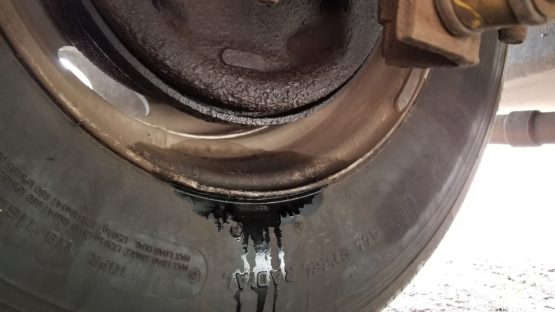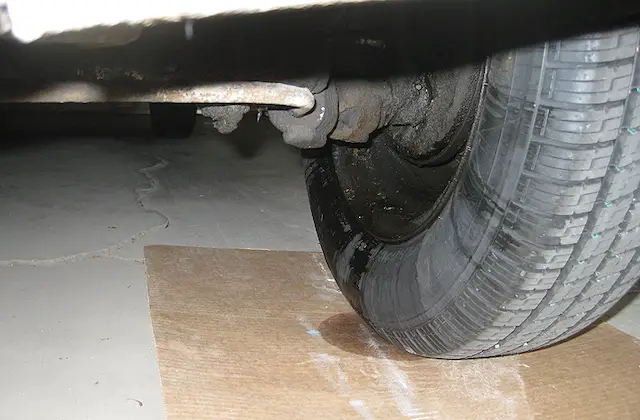Brake fluid on tires can damage the rubber, reducing tire integrity and grip, which can lead to safety issues. It’s essential to clean off brake fluid immediately to avoid weakening the tire and causing uneven wear. Left unattended, brake fluid can permanently damage the tire, potentially leading to a blowout.
Brake fluid is a vital part of a vehicle’s braking system, enabling the transfer of force to help stop the car. However, when brake fluid spills onto tires or other components of the car, it can cause significant damage, reduce tire performance, and pose safety risks.
This blog post will explore the impact of brake fluid on tires, why it should be avoided, how to clean up brake fluid spills, and answer some frequently asked questions about this topic.

Contents
Why is Brake Fluid Harmful to Tires?
Brake fluid can have a harmful impact on tires for a few reasons:
1. Rubber Damage
Tires are made from a specific type of rubber compound designed to withstand road wear, heat, and other stresses. Brake fluid, however, is formulated with chemicals that can degrade rubber over time. When brake fluid gets onto a tire, it can soften, swell, or weaken the rubber, potentially compromising the structural integrity of the tire.
2. Reduced Traction
Brake fluid can leave a slippery residue on the tire’s surface, leading to reduced grip and traction. A loss of traction, even temporarily, can be dangerous, especially if it impacts the vehicle’s stability on the road. In high-speed or wet conditions, this loss of traction can increase the risk of skidding or accidents.
3. Increased Tire Wear
If brake fluid remains on the tire for an extended period, it can cause uneven wear patterns. The chemical breakdown of the rubber on certain areas of the tire leads to weak spots, which wear out faster than the rest of the tire. This uneven wear reduces the tire’s lifespan and could lead to an unexpected blowout.
4. Environmental Concerns
Brake fluid is hazardous to the environment. When it’s left on a tire and eventually washed away by rain or runoff, it can enter storm drains and contaminate water systems, harming wildlife and vegetation. This environmental impact adds another layer of importance to properly handling brake fluid spills.
What to Do if Brake Fluid Gets on Tires
If you notice brake fluid on your tires, it’s essential to clean it off immediately. Here’s a step-by-step guide on what to do:
Step 1: Act Quickly
The faster you respond to brake fluid spills on tires, the better the chances of preventing long-term damage. Once the brake fluid starts breaking down the rubber, it becomes more difficult to reverse the damage.
Step 2: Wipe Off Excess Fluid
Use a clean, absorbent cloth to gently dab and remove any excess brake fluid from the tire surface. Avoid spreading the fluid further onto the tire or other nearby components.
Step 3: Clean the Tire with Soap and Water
Mix mild soap with warm water and use a brush to scrub the affected area of the tire. Make sure to thoroughly rinse off the soap with clean water afterward. Avoid using harsh chemicals or solvents, as these can further damage the tire.
Step 4: Use a Degreaser if Necessary
If the brake fluid has left an oily residue that soap and water didn’t fully remove, a mild degreaser can help. However, it’s essential to choose a rubber-safe degreaser that won’t cause further harm to the tire. After applying the degreaser, rinse the area thoroughly with water.
Step 5: Inspect the Tire for Damage
After cleaning, inspect the tire for any visible signs of damage, such as soft spots, swelling, or cracks. If any damage is present, it’s best to consult a tire professional to evaluate whether the tire needs to be replaced.

How to Prevent Brake Fluid Spills on Tires
Taking proactive steps can help you avoid brake fluid getting onto tires. Here are some preventative measures:
- Check Brake Lines Regularly: Regular inspections of brake lines and connections can help detect leaks early, preventing brake fluid from dripping onto tires.
- Be Cautious During Brake Fluid Top-Ups: When refilling or working with brake fluid, avoid spills by using a funnel and cleaning up any drips immediately.
- Park Carefully on Inclines: If your car is leaking brake fluid, parking on an incline can cause the fluid to drip toward the wheels. Until the leak is fixed, try to park on level ground or use drip pans.
Risks of Leaving Brake Fluid on Tires
Leaving brake fluid on a tire without cleaning it off can have serious consequences:
- Loss of Tire Integrity: The rubber will break down over time, compromising the structural strength of the tire and increasing the risk of a blowout.
- Reduced Safety: The tire’s grip on the road may be diminished, especially in adverse conditions, increasing the likelihood of accidents.
- Increased Maintenance Costs: Brake fluid damage can shorten tire life, leading to premature replacement costs. Additionally, brake fluid can corrode nearby components, resulting in costly repairs.
Related Article
Brake Fluid on Skin
Brake Fluid in Gas Tank
Brake Fluid in Eye
Frequently Asked Questions
Here are some FAQs about brake fluid on tires –
1. Can brake fluid permanently damage a tire?
Yes, brake fluid can permanently damage a tire if left on it for an extended period. The chemicals in brake fluid can break down the rubber, causing it to weaken and lose structural integrity. In severe cases, the tire may need to be replaced.
2. Is it safe to drive with brake fluid on my tires?
It’s best to avoid driving with brake fluid on your tires. The fluid can make the tire surface slippery, reducing traction and creating a safety hazard, especially in wet conditions. Clean the fluid off as soon as possible to ensure safe driving.
3. Can brake fluid cause the tire to burst?
While brake fluid alone may not directly cause a tire to burst, it can weaken the tire’s rubber over time, increasing the risk of a blowout. If the brake fluid has caused soft spots or visible damage to the tire, replacement may be necessary to avoid the risk of a blowout.
4. What should I use to clean brake fluid off tires?
Start with mild soap and water, then scrub the affected area with a brush. If necessary, use a rubber-safe degreaser to remove any remaining residue. Avoid harsh chemicals that can further degrade the rubber.
5. How can I prevent brake fluid from spilling onto my tires?
Regularly check brake lines and connections for leaks, use caution when handling brake fluid, and keep your braking system maintained. Proper parking and spill cleanup during brake fluid refills can also help prevent spills from reaching your tires.
Conclusion
Brake fluid on tires is more than just an inconvenience—it poses risks to your safety, tire health, and potentially even the environment. Acting quickly to clean off brake fluid spills, taking preventive measures, and knowing the signs of brake fluid damage are essential steps in keeping your vehicle safe and in good condition. If you’re ever unsure about the severity of brake fluid damage to your tires, consulting a professional can provide the peace of mind you need to keep your vehicle road-ready.